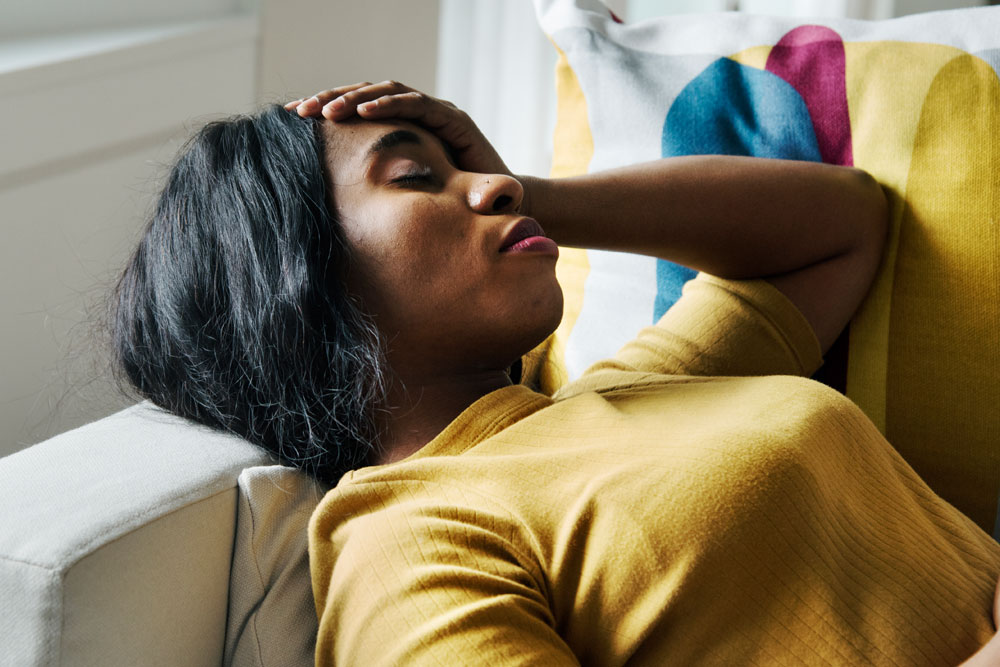What You Can Do When You Are Blindsided By Anxiety
Published on February 22nd, 2024

The dreaded feeling of anxiety can blast into your body when you least expect it. It is a feeling many anxiety sufferers know all too well. It may even cause some anxiety responses in your body to even think about being blindsided by anxiety or an anxiety attack. The experience of anxiety may cause:
- Shaking
- Sweating
- Hot flashes
- Pounding heartbeat
- A sense of fear or doom
- Uncontrollable worry
- Chest tightness
- Headache
- Dizziness
Anxiety can be managed in the moment, which can help to prevent an anxiety attack. Here are some ways to manage that anxiety/panic when it hits you out of nowhere:
1. STOP
When the feelings of anxiety start to spike, stop whatever you are doing and breathe. In most situations, we can stop and take a moment to care for our needs by either going to the restroom, pausing for a break, or simply stating that a break is needed. And yes, we have all heard to take deep breaths when feeling anxious and it’s almost cliché at this point. However, biologically speaking, oxygen helps to reduce the stress hormones in your body, which helps to calm your anxiety.
Sponsored by

Choose a therapist to work with and start healing with 20% off from BetterHelp.
Click Here2. Name It
Name what you are feeling. Say out loud or in your mind, I feel anxious. Naming your feelings helps to give you awareness of the feeling. It can also help to normalize the experience in your mind and body.
Example: This is anxiety, I am not losing my mind. It is not in control if I do not allow it, and it will pass.
3. Grounding
Grounding is a strategy used to remind your body that you are connected to the earth and you are present in this moment. Some people find sitting and noticing the feeling of the chair beneath them to be helpful, while others like to do some body squats or take a walk and notice the pressure of each step under the feet. The goal of grounding is to feel your body connected to the ground, chair, couch, etc., and notice that connection through the pressure and sensations in your body.
4. Orient To The Space
Orienting is the act of finding your positioning within the space. Orienting helps the brain to scan the environment for possible threats. This helps to calm anxiety as it shows you that there is no threat (assuming there is no actual threat).
Example: o orient to the space, you will look around the room, slowly scanning and noticing the colors, textures, lights, interesting things, likes, dislikes, etc. You can name them in your mind or say them out loud: “I see a lamp, I like the blue color of the wall, the painting has an interesting texture.” Do this a few times, slowly.
5. Repeat A Saying/Mantra
It helps to have a mantra prepared and practiced before your anxiety flares. Prepare a saying that you will repeat in your mind when anxiety starts. The sayings could be “I am safe,” “This will pass soon” or another saying that helps you focus your mind. Repeating the saying can help to reduce or stop circulating thoughts. Repeat the saying at a slow, steady pace in your mind or out loud.
6. Ride The Wave
Riding the wave is a Dialectical Behavioral Therapy (DBT) term used to describe the act of allowing emotions to come and go like ocean waves. Allowing the sensations and emotions to be present (without judging yourself) can help your body to overcome the anxious response. Notice the sensations and emotions in your body and allow them to be present and then feel them wash away.
7. Body Pressure
Body squeezes, weighted objects or a hug from a safe, known person are strategies that could help to reduce anxiety. The pressure may help you contain the feelings and sensations and feel the boundary of the body. When the body pressure is applied, focus on the area with the most pressure or the area of the body calling for the most attention.
Note: The pressure should be changed if it is uncomfortable or feels like it is too much, painful, or constricting. Pressure needs may change as the emotions and sensations process and move in the body.
8. Distract Yourself
Distraction is especially useful if you do not have a lot of time and the pressure of moving on with a task or event is causing more distress. Distraction can come in the form of conversation with another person, watching a video, reading a book, doing push-ups, or any other activity that requires your attention to be in the space around you.
9. Seek Support
If a trusted person is near tell them what is happening to you. Having a trusted person there to support you through the anxiety or anxiety attack can help you to feel safe and reduce the feeling of being alone. The person may also be able to advocate for you to take a break, step outside, or remind you to breathe deeply.
It is also a good idea to seek professional support if anxiety continues to be an area of concern or causes disruptions in your life.
10. Try Again
Sometimes, all of the techniques in the world just do not help the anxiety move on through your body. Remember, you are human. Sometimes, you may need to leave a situation and try again another time.
Sponsored by

Find an affordable therapist online with 20% off from BetterHelp.
Click Here






Leave A Reply